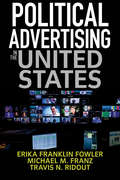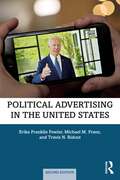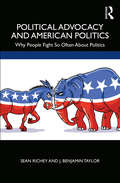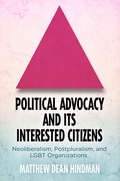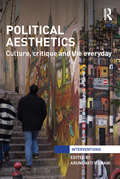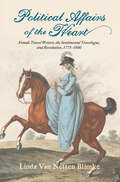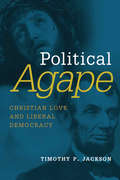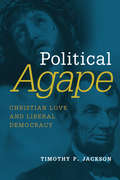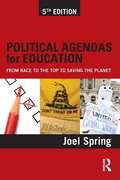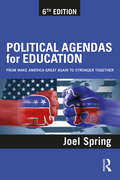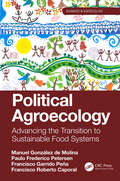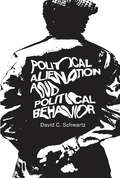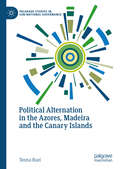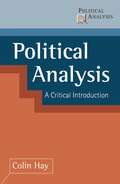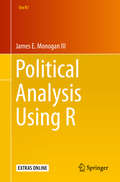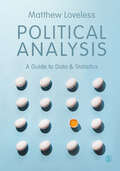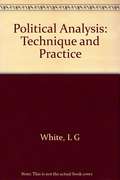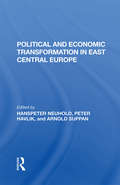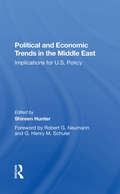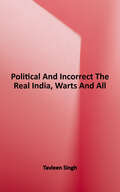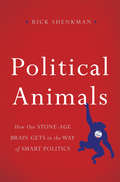- Table View
- List View
Political Advertising in the United States
by Erika Franklin FowlerPolitical advertising is as important as ever?ad spending records are broken each election cycle, and the volume of ads aired continues to increase. Political Advertising in the United States is a comprehensive survey of the political advertising landscape and its influence on voters. The authors, co-directors of the Wesleyan Media Project, draw from the latest data to analyze how campaign finance laws have affected the sponsorship and content of political advertising, how ?big data? has allowed for more sophisticated targeting, and how the Internet and social media has changed the distribution of ads. With detailed analysis of presidential and congressional campaign ads and discussion questions in each chapter, this accessibly written book is a must-read for students, scholars and practitioners who want to understand the ins and outs of political advertising.
Political Advertising in the United States
by Michael M. Franz Travis N. Ridout Erika Franklin FowlerPolitical Advertising in the United States examines the volume, distribution, content, and effects of political advertising in congressional and presidential elections. The book considers the role of television ads using extensive data on ad airings on local broadcast stations. It also analyzes newly available data on paid digital ads, including ads on Facebook, Instagram, Google, and YouTube. The book covers the role of outside groups in airing ads, including the rise of dark money groups and gaps in existing federal campaign finance laws around transparency of outside group spending. The authors consider how ad sponsors design and target ads. They also review the positive and negative implications of an electoral system where billions are spent on paid advertising. With detailed analysis of presidential and congressional campaign ads and discussion questions in each chapter, this accessibly written book is a must-read for students, scholars, and practitioners who want to understand the ins and outs of political advertising. New to the Second Edition • Covers the spending, content, and tone of political advertising in the 2016 and 2020 presidential elections and the 2018 midterms, looking ahead to 2022 and 2024. • Addresses the interference of foreign actors in elections and their connection to political advertising. • Expands the discussion of digital political advertising and incorporates this topic into every chapter. • Adds a new chapter specifically addressing digital ad content and spending. • Includes data from the Facebook, Google, and Snapchat ad libraries and explores the role of these companies in regulating the sale of political advertising. • Incorporates new data on the effects of race and gender in advertising, including what is known about the way in which advertising may activate prejudicial attitudes.
Political Advocacy and American Politics: Why People Fight So Often About Politics
by J. Benjamin Taylor Sean RicheyPolitical Advocacy and American Politics provides a detailed explanation as to why citizens engage in interpersonal advocacy in the United States. Sean Richey and J. Benjamin Taylor eloquently show how the campaigns, social media, and personality and partisanship affect one's propensity for candidates, which often leads to arguments about politics. Using original qualitative, survey, and experimental studies, Richey and Taylor demonstrate the causes of political advocacy over time in the political environment and at the individual level. While some worry about the incivility in American politics, Richey and Taylor argue political talk, where conflict is common, is caused by high-activity democratic processes and normatively beneficial individual attributes. Furthermore, Richey and Taylor argue that advocacy—when conceptualized as a democratic "release valve"—is exactly the kind of conflict we might expect in a vibrant democracy. Political Advocacy and American Politics: Why People Fight So Often About Politics is ideal for university students and researchers, yet it is also accessible to any reader looking to learn more about the role campaigns and personal attributes play in the decision to advocate.
Political Advocacy and Its Interested Citizens: Neoliberalism, Postpluralism, and LGBT Organizations (American Governance: Politics, Policy, and Public Law)
by Matthew Dean HindmanAdvocates representing historically disadvantaged groups have long understood the need for strong public relations, effective fundraising, and robust channels of communication with the communities that they serve. Yet the neoliberal era and its infusion of money into the political arena have deepened these imperatives, thus adding new financial hurdles to the long list of obstacles facing minority communities. To respond to these challenges, a professionalized, nonprofit model of political advocacy has steadily gained traction. In many cases, advocacy organizations sought to harness and redirect the radical verve that characterized the protest movements of the 1960s into pragmatic, state-sanctioned approaches to political engagement.In Political Advocacy and Its Interested Citizens, Matthew Dean Hindman looks at how and why contemporary political advocacy groups have transformed social movements and their participants. Looking to LGBT political movements as an exemplary case study, Hindman explores the advocacy explosion in the United States and its impact on how advocates encourage citizens to understand their role in the political process. He argues that current advocacy groups encourage members of the LGBT community to view themselves as stakeholders in a common struggle for political incorporation. In doing so, however, they often overshadow more imaginative and transformational approaches that could unsettle and challenge straight society and its prevailing political and sexual norms. Advocacy groups carved out a space within a neoliberalizing political process that enabled them to instruct their members, followers, and constituents on serving effectively as industrious political claimants. Political Advocacy and Its Interested Citizens thus sheds light on grassroots politics as it is practiced in present-day America and offers a compelling and original analysis of the ways in which neoliberalism challenges citizens to participate as consumers and investors in the advocacy marketplace.
Political Aesthetics: Culture, Critique and the Everyday (Interventions)
by Arundhati VirmaniPolitical Aesthetics highlights the complex and ambiguous connections of aesthetics with social, cultural and political experiences in contemporary societies. If today aesthetics seems a rather overused term, mixing a variety of historical realities and complex personal states of being, its relevance as a connecting agent between individual, state and society is stronger than ever. The actual context of political and economic crisis generates new relations between official imposed aesthetics and the resistance and critiques they trigger. Considered beyond the poles of power and protest, the book examines how traditional or innovative artistic practices may acquire unexpected capacities of subversion. It nourishes the current debate around the new political stakes of aesthetics as an inviolable right of ordinary citizens, an essential element of empowerment and agency in a democratic every day. It will be of interest to students and scholars of international relations, political culture and political aesthetics, as well as critical sociology and history. It will also be useful for some broad courses in media studies, cultural studies, and sociology.
Political Affairs of the Heart: Female Travel Writers, the Sentimental Travelogue, and Revolution, 1775-1800 (Transits: Literature, Thought & Culture 1650-1850)
by Linda Van BlimkeRichly researched and engagingly written, Political Affairs of the Heart traces the emergence of female sentimental travel writing in late eighteenth-century Britain, and posits its centrality to women’s engagement with national and gender politics. This study examines four travel narratives written by women between 1774 and 1795, convincingly arguing that they effectively deploy the discourse of sensibility to engage with debates around Britain’s national identity during the French and American Revolutions. Van Netten Blimke contends that Laurence Sterne’s A Sentimental Journey (1768)—which first introduced sentimental discourse to the travelogue—facilitated women’s gradual inclusion into this previously male-dominated genre, effectively paving the way for women to influence the country’s sociopolitical transformation. These four previously understudied works successfully combine eyewitness authority with the language of sensibility to mount impassioned interventions in their nation’s perception and practice of revolutionary politics, at a time when its national identity was most in flux.
Political Affect: Connecting the Social and the Somatic (Posthumanities #7)
by John ProteviFor many philosophers, the rational cognitive (Cartesian) subject defines the human, or at least defines what humans should be. Yet some recent cognitive science, as well as the philosophy of Deleuze and Guattari, has called into question such individuality and rationality and emphasized social and emotional subjectivity. Understanding such embodied and embedded subjectivity, John Protevi argues, demands the notion of bodies politic.In Political Affect, Protevi investigates the relationship between the social and the somatic: how our bodies, minds, and social settings are intricately and intimately linked. Bringing together concepts from science, philosophy, and politics, he develops a perspective he calls political physiology to indicate that subjectivity is socially conditioned and sometimes bypassed in favor of a direct connection of the social and the somatic, as with the politically triggered basic emotions of rage and panic. Protevi's treatment of affective cognition in social context breaks new theoretical ground, insisting that subjectivity be studied both in its embodied expression and in terms of the distribution of affective cognitive responses in a population.Moving beyond the theoretical, Protevi applies his concept of political affect to show how unconscious emotional valuing shaped three recent, emotionally charged events: the cold rage of the Columbine High School slayings, the racialized panic that delayed rescue efforts in Hurricane Katrina, and the twists and turns of empathy occasioned by the Terry Schiavo case. These powerful individual and collective political events require new philosophical understanding.
Political Agape: Christian Love and Liberal Democracy (Emory University Studies in Law and Religion)
by Timothy P. JacksonWhat is the place of Christian love in a pluralistic society dedicated to “liberty and justice for all”? What would it mean to take both Jesus Christ and Abraham Lincoln seriously and attempt to translate love of God and neighbor into every quarter of life, including law and politics?Timothy Jackson here argues that agapic love of God and neighbor is the perilously neglected civil virtue of our time -- and that it must be considered even before justice and liberty in structuring political principles and policies. Jackson then explores what “political agape” might look like when applied to such issues as the death penalty, same-sex marriage, and adoption.
Political Agape: Christian Love and Liberal Democracy (Emory University Studies in Law and Religion)
by Timothy P. JacksonWhat is the place of Christian love in a pluralistic society dedicated to “liberty and justice for all”? What would it mean to take both Jesus Christ and Abraham Lincoln seriously and attempt to translate love of God and neighbor into every quarter of life, including law and politics?Timothy Jackson here argues that agapic love of God and neighbor is the perilously neglected civil virtue of our time -- and that it must be considered even before justice and liberty in structuring political principles and policies. Jackson then explores what “political agape” might look like when applied to such issues as the death penalty, same-sex marriage, and adoption.
Political Agendas for Education
by Joel SpringThe Fifth Edition of Joel Spring's ongoing documentation and analysis of political agendas for education reflects the major political issues in education since 2008. This edition focuses on the education sections of the 2012 Republican, Democratic, Green, and Libertarian Party platforms. Taking a fresh look at the social and political forces, educational research, and ideologies shaping the educational agendas of these political parties and a comparative approach, the book stimulates reflection and discussion. New coverage in the Fifth Edition includes: * The political coup called Race to the Top* Common Core State Standards and national testing based on the Standards* Explosion of online instruction* Debates about teacher evaluations and merit pay* Growing for-profit education industry* New agenda for American Education: Constitutional amendment; long life and happiness; environmental education Political Agendas for Education is essential reading for courses dealing with the politics of education, foundations of education, educational leadership, and curriculum studies, and for educational scholars, professionals, policymakers, and all those concerned with the politics of education in the U.S. and its consequences for schools and society.
Political Agendas for Education: From Make America Great Again to Stronger Together
by Joel SpringFollowing the epic, contentious 2016 presidential election, Joel Spring’s ongoing documentation and analysis of political agendas for education reflect the major political issues since 2012. Here he examines the 2016 education planks of the Republican, Democratic, Libertarian, and Green Parties, using their official platforms and other statements, speeches given by each candidate, and media reports and publications. Each party’s position is linked to previous political movements in education. Spring offers an alternative agenda for American schools, including a proposed education amendment to the U.S. Constitution and replacing human capital agendas with goals emphasizing education for a long life and happiness. Taking a fresh look at the social and political forces, educational research, and ideologies shaping their educational agendas and a comparative approach, the book stimulates reflection and discussion. Updates and changes in the Sixth Edition: Betsy DeVos’s education agenda supporting vouchers, free market competition and for-profit schools and its relationship to the education section of the 2016 Republican platform The important role religion and culture played in the evolution of Republican education policies after the school prayer and Bible decisions of the 1960s The influence of human capital economics on Democratic education proposals How No Child Left Behind and Democratic President Barack Obama opened doors to the growth of the for-profit education industry and investment bankers The 2016 Democratic positions on the cost of higher education and student loan debts The Democratic left as represented by the 2016 campaign of Democrat Bernie Sanders and his influence on the presidential candidate Hillary Clinton and the Democratic Party platform The education proposals of the Green and Libertarian parties
Political Agroecology: Advancing the Transition to Sustainable Food Systems (Advances in Agroecology)
by Manuel González de Molina Paulo Frederico Petersen Francisco Garrido Peña Francisco Roberto CaporalPolitical Agroecology is the first book to offer a systematic and articulated reflection on Political Agroecology from the Agroecological perspective. It defines the disciplinary field responsible for designing and producing actions, institutions and regulations aimed at achieving agrarian sustainability. In short, it aims to build a political theory that makes the scaling-up of agroecological experiences possible, turning them into the foundation of a new and alternative food regime. The book proposes theoretical, practical and epistemological foundations of a new theoretical and practical field of work for agroecologists: Political Agroecology. It establishes a framework for a common agroecological strategy, covering the different levels of collective action and the different instruments with which it can be developed. This will be essential reading for agroecologists, environmentalists, farming and food communities, and an ideal textbook for advanced agroecology courses in universities. Key features: Offers a unique state of the art on this fundamental new topic: Political Agroecology Presents a complete introduction to the political and institutional aspects of Agroecology, covering the whole food system Offers an important tool for searching agrarian sustainability Provides a broad epistemological, theoretical and methodological focus, exploring the connection between the different levels and scales involved in agroecological theory and practice
Political Aid and Arab Activism
by Sheila CarapicoWhat does it mean to promote 'transitions to democracy' in the Middle East? How have North American, European and multilateral projects advanced human rights, authoritarian retrenchment or Western domination? This book examines transnational programs in Egypt, Jordan, Morocco, Yemen, Lebanon, Tunisia, Algeria, the exceptional cases of Palestine and Iraq, and the Arab region at large during two tumultuous decades. To understand the controversial and contradictory effects of political aid, Sheila Carapico analyzes discursive and professional practices in four key subfields: the rule of law, electoral design and monitoring, women's political empowerment and civil society. From the institutional arrangements for extraordinary undertakings such as Saddam Hussein's trial or Palestinian elections to routine templates for national women's machineries or NGO networks, her research explores the paradoxes and jurisdictional disputes confronted by Arab activists for justice, representation and 'non-governmental' agency.
Political Alienation and Political Behavior
by David C. SchwartzWhy do people adopt attitudes of political alienation--attitudes of estrangement from, or lack of identification with, the political system? Why do some politically alienated people react to their alienation by engaging in revolutionary behavior, while others similarly alienated--become reformers or ritualists, and still others simply drop out of political activity?In Political Alienation and Political Behavior, David C. Schwartz attempts to answer these questions, challenging accepted theories of social status and economic difficulties and developing a completely new, three variable psychological theories to explain alienation. Based on observations of threat from value conflict, perceived personal inefficacy, and perceived systemic inefficacy, the theory includes a process model for predicting political behavior.The book is organized into a definition and discussion of the concept of political alienation, including reviews and critiques of relevant scholarly and popular literature; a theoretical explanation of the causes and consequences of alienation; presentation of data; research reports testing the author's explanation of political alienation; tests of a process model explaining the consequences of alienation; and a summary of the major findings of the research, indicating some of the directions that future research might profitably take.Fascinating reading for social scientists, this well-written book will be important to teachers and students concerned with U.S. politics and more generally with the relationship of economic, social, and psychological forces manifested in political behavior.
Political Allegiance After European Integration
by Jonathan WhiteHow should political community be seen in the context of European integration? This book combines a theoretical treatment of political allegiance with a study of ordinary citizens, examining how taxi-drivers in Britain, Germany and the Czech Republic talk politics and situate themselves relative to political institutions and other citizens.
Political Alternation in the Azores, Madeira and the Canary Islands (Palgrave Studies in Sub-National Governance)
by Teresa Ruel“In this innovative study, Dr Ruel explores why political alternation—a bedrock of democratic functioning—has been largely absent in three under-studied regions in Portugal and Spain. Focusing on Madeira, the Azores and the Canary Islands, this book explains how party competition, intra-party democracy and regional economic performance have contributed to political party stasis since the return of democracy in the mid-1970s.” —Paul M. Heywood, Sir Francis Hill Professor of European Politics seconded 0.5 FTE to Global Integrity, Washington DC (2018-21), Faculty of Social Science, University of Nottingham, UK This book is about political alternation. It’s about parties and politicians. It’s about power and resources employed to secure longevity in power over time at Azores, Madeira and the Canary Islands. This book explores the phenomenon of political alternation through an in-depth contextual understanding of the path of regional historical legacies at democratization and decentralization processes started in the 1970s; the institutional architectures and the scope of regional authority endowed in those regions; the specific dynamics of regional politics; and the constellation of political parties and actors and the regional elections results, as well as contextual factors that might explain why some political parties have better performances than other at regional elections. Throughout comparative lessons Ruel seeks to highlight the range of factors that affect regional electoral dynamics and outcomes and to develop a comprehensive understanding of the drivers of long-standing incumbency (Azores and Canary Islands) or the absence of political alternation (Madeira) within regional democracies.
Political Analysis
by Colin Hay"Political Analysis" provides an accessible introduction to the analysis of political structures, institutions, ideas and behaviours and, above all, to the political processes through which they are constantly made and remade. ; Following an innovative introduction to the main approaches and concepts in political analysis, the text focuses thematically on the key issues which currently concern and divide political analysts, including the boundaries of the political the question of structure, agency and power the dynamics of political change the relative significance of ideas and material factors and the challenge posed by postmodernism which the author argues the discipline can strengthen itself by addressing without allowing it to become a recipe for paralysis.
Political Analysis Using R
by James E. MonoganThis book provides a narrative of how R can be useful in the analysis of public administration, public policy, and political science data specifically, in addition to the social sciences more broadly. It can serve as a textbook and reference manual for students and independent researchers who wish to use R for the first time or broaden their skill set with the program. While the book uses data drawn from political science, public administration, and policy analyses, it is written so that students and researchers in other fields should find it accessible and useful as well. By the end of the first seven chapters, an entry-level user should be well acquainted with how to use R as a traditional econometric software program. The remaining four chapters will begin to introduce the user to advanced techniques that R offers but many other programs do not make available such as how to use contributed libraries or write programs in R. The book details how to perform nearly every task routinely associated with statistical modeling: descriptive statistics, basic inferences, estimating common models, and conducting regression diagnostics. For the intermediate or advanced reader, the book aims to open up the wide array of sophisticated methods options that R makes freely available. It illustrates how user-created libraries can be installed and used in real data analysis, focusing on a handful of libraries that have been particularly prominent in political science. The last two chapters illustrate how the user can conduct linear algebra in R and create simple programs. A key point in these chapters will be that such actions are substantially easier in R than in many other programs, so advanced techniques are more accessible in R, which will appeal to scholars and policy researchers who already conduct extensive data analysis. Additionally, the book should draw the attention of students and teachers of quantitative methods in the political disciplines.
Political Analysis: A Guide to Data and Statistics
by Matthew LovelessWhy let other people explain the world to you? From news reporting on elections or unfolding political crises to everyday advertising, you are confronted with statistics. Rather than being swayed by bad arguments and questionable correlations, this book introduces you to the most common and contemporary statistical methods so that you can better understand the world. It′s not about mindless number crunching or flashy techniques but about knowing when to use statistics as the best means to analyse a problem. Whether you want to answer: "Who is most likely to turn out and vote at the next election?" or "What accounts for some political conflicts escalating to war?" you’ll explore what can and can’t be done with statistics, and how to select the most appropriate statistical techniques and correctly interpret the results. Perhaps you simply want to understand enough to pass your statistics class and move on. Maybe you want to build your knowledge so that you are not excluded from research and debate. Or it could be the first step towards more advanced study. Whatever your goal, this book guides you through the journey, empowering you to confidently interact with statistics to make you a more formidable student, employee, and democratic citizen.
Political Analysis: A Guide to Data and Statistics
by Matthew LovelessWhy let other people explain the world to you? From news reporting on elections or unfolding political crises to everyday advertising, you are confronted with statistics. Rather than being swayed by bad arguments and questionable correlations, this book introduces you to the most common and contemporary statistical methods so that you can better understand the world. It′s not about mindless number crunching or flashy techniques but about knowing when to use statistics as the best means to analyse a problem. Whether you want to answer: "Who is most likely to turn out and vote at the next election?" or "What accounts for some political conflicts escalating to war?" you’ll explore what can and can’t be done with statistics, and how to select the most appropriate statistical techniques and correctly interpret the results. Perhaps you simply want to understand enough to pass your statistics class and move on. Maybe you want to build your knowledge so that you are not excluded from research and debate. Or it could be the first step towards more advanced study. Whatever your goal, this book guides you through the journey, empowering you to confidently interact with statistics to make you a more formidable student, employee, and democratic citizen.
Political Analysis: Technique And Practice
by Louise G. WhiteThis text gives students the skills necessary for analyzing important political issues logically and systematically. Louise White guides students through the entire research design process step-by-step, from formulating sound questions and devising strategies for answering them to analyzing and presenting the results. Exercises throughout let students apply and practice these skills using examples based on real world data and current political events.
Political And Economic Transformation In East Central Europe
by Peter Havlik Hanspeter Neuhold Arnold SuppanThis is an examination of the progress that Croatia, the Czech Republic, Hungary, Poland, Slovakia and Slovenia have made in the process of transformation since the collapse of the Soviet bloc. Looking at issues such as democratization, the transition to a market economy and the new orientations in foreign policy, this book provides a report of th
Political And Economic Trends In The Middle East: Implications For U.S. Policy
by Nancy Eddy Shireen Hunter Heidi ShinnThis book explores the rapid changes in the economics and politics of the Middle East, which profoundly influence U.S. policy and interests in the region. The contributors examine elements in the economic picture, including falling oil prices and the uncertainty surrounding OPEC; the concomitant drop in oil revenues and its effect on the spending p
Political And Incorrect: The Real India, Warts And All
by Tavleen SinghMany Prime ministers and governments later, India too has changed, in some ways beyond belief. This work keeps abreast of those changes.
Political Animals: How Our Stone-age Brain Gets In The Way Of Smart Politics
by Rick ShenkmanCan a football game affect the outcome of an election? What about shark attacks? Or a drought? In a rational world the answer, of course, would be no. But as bestselling historian Rick Shenkman shows in Political Animals, our world is anything but rational. This isn’t because we aren’t smart. Instead, modern cues are setting off ancient, instinctive responses that worked to keep us safe in the Stone Age but lead us astray today. Pop culture tells us we can trust our instincts. But science is demonstrating that when it comes to politics, our Stone Age brains can malfunction and misfire. Fortunately, we can learn to override our instincts and ensure that they work in our favor. Drawing on science, politics, and history, Shenkman explores the hidden reasons behind our political choices and uncovers the invisible forces that are truly responsible for victory or defeat at the ballot box.
